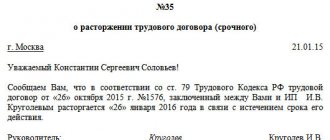ORGANIZATIONS ARE PROHIBITED in relation to a pregnant woman:
- reduce wages for reasons related to pregnancy;
- involve a pregnant woman in work: - at night - from 22 to 6 o'clock (Article 96 of the Labor Code of the Russian Federation), - overtime (i.e. work performed by an employee at the initiative of the employer outside the established working hours (Article 99 of the Labor Code of the Russian Federation) ), - on weekends and non-working holidays (Article 259 of the Labor Code of the Russian Federation), - on a rotational basis - a special form of carrying out the labor process outside the employee’s place of permanent residence, when their daily return home cannot be ensured (Article 298 of the Labor Code of the Russian Federation);
- send her on business trips (Article 259 of the Labor Code of the Russian Federation);
- replace her annual (main and additional) paid leave with monetary compensation (Article 126 of the Labor Code of the Russian Federation), with the exception of payment of monetary compensation for unused leave if the woman decides to quit;
- recall her from annual paid leave (Article 125 of the Labor Code of the Russian Federation);
- transfer and relocate a woman to work that is contraindicated for her due to health reasons (Article 72.1 of the Labor Code of the Russian Federation).
Employer's liability
The employer's responsibility is prescribed in Article 419 of the Labor Code of the Russian Federation, which states that if there are violations, the management of the enterprise is involved in proceedings. Here there are administrative, disciplinary, legal, material and criminal liability. Failure to comply with Article 259 of the Labor Code of the Russian Federation entails the first type of violation, which is expressed in the payment of a fine ranging from 10 to 130 thousand rubles.
https://youtu.be/gK3kZkj0Xds
The size of the financial penalty is determined by the degree of violation. For example, if the head of an enterprise refuses to renew the contract at the end of the term, he faces a fine of 50 thousand rubles. And if a pregnant employee has contraindications for performing her actual work, the amount will increase to 130 thousand rubles.
Compliance with Article 259 of the Labor Code of the Russian Federation is mandatory for all managers of enterprises and individual entrepreneurs. Otherwise, violations of the rights of a pregnant woman lead to administrative liability and financial penalties.
The ORGANIZATION IS OBLIGED in relation to a pregnant woman:
- provide, at the request of a pregnant woman, annual paid leave before or immediately after maternity leave;
- provide maternity leave (Article 255 of the Labor Code of the Russian Federation) based on a woman’s application and a certificate of incapacity for work (140 calendar days for normal births; 156 for complicated ones; 194 for multiple pregnancies);
- pay maternity benefits (Article 255 of the Labor Code of the Russian Federation);
- pay a one-time benefit to women who register in the early stages of pregnancy (up to 12 weeks);
- in accordance with the medical report provided by the woman: - reduce her production standards or service standards by an average of 40% of the constant norm; - transfer a pregnant woman to another job - easier and excluding the impact of unfavorable production factors, while maintaining the same average earnings (Article 254 of the Labor Code of the Russian Federation). - release her from work while maintaining the average earnings for all working days missed as a result at the expense of the employer, until she is provided with another job (excluding the impact of unfavorable production factors);
- establish, at her request, a part-time or part-time work week (Article 93 of the Labor Code of the Russian Federation). In this case, remuneration will be made in proportion to the time worked or depending on the amount of work performed. Work under such conditions does not entail any restrictions on the duration of the annual basic paid leave, calculation of length of service and other labor rights;
- create hygienically safe working conditions and optimal working environment conditions, i.e. A pregnant woman should not be allowed to work: - related to the use of potentially hazardous chemicals in production, incl. allergenic and carcinogenic in terms of impact on reproductive function; - under conditions of exposure to extremely and highly hazardous (class I and II) chemicals, as well as those that have repulsive, disgusting odors, or do not have a toxicological assessment; — associated with exposure to pathogens of infectious, parasitic and fungal diseases; - under conditions of exposure to infrared radiation, especially aimed at the woman’s abdomen and pelvis; — at installations and structures that are sources of electromagnetic radiation, the parameters of which go beyond the optimal values established for residential premises; — in conditions of sudden changes in barometric pressure (for example, flight crews, flight attendants and other professions); — under conditions of exposure to industrial aerosols of predominantly fibrogenic and mixed types of action; — as an operator of copying and duplicating machines; — in the field of crop production and livestock farming; — with disinfectants, insecticides, pesticides and agrochemicals; - perm and hair coloring (for those working by profession - hairdresser); - associated with lifting objects of labor above the level of the shoulder girdle, with lifting objects from the floor, with a predominance of static tension in the muscles of the legs and abdominals, forced working posture (squatting, kneeling, bending over, resting the stomach and chest on equipment and objects of labor), with a torso tilt of more than 15 degrees, as well as work on equipment controlled by a foot pedal; operations on a conveyor with a forced rhythm of work, accompanied by nervous and emotional stress, should also be excluded.
Law protecting the right to work of pregnant women and people with family responsibilities
It is important for the employer to understand that ignorance of the laws does not exempt them from responsibility for failure to comply with them, and workers must know that they have legal mechanisms to protect their rights, in particular in court.
Many employers extremely dislike the situation when a pregnant woman works at the enterprise, since her social status requires special protection and guarantees.
The essence of Art. 261 Labor Code of the Russian Federation
Article 261 of the Labor Code of the Russian Federation contains norms that regulate the following points:
- As a general rule, employment contracts with pregnant women cannot be terminated (except for fixed-term ones, but they also have their moments).
- There are specific general situations when dismissal is inevitable.
- Termination of an employment contract by agreement of the parties and at the request of the employee is permitted on a general basis.
As a rule, some employers take advantage of the opportunity indicated in the last paragraph and use methods of psychological pressure on the woman. They believe that she will not withstand the press and will write a letter of resignation of her own free will.
The main goal of this behavior by management is quite clear: not to pay for help. Plus, few people want to look for new employees to fill the position during the maternity leave of the main employee. Therefore, it is better for such managers to get the pregnant woman fired and hire a new person without the threat of going on maternity leave.
You can and should fight such pressure. Firstly, do not leave of your own accord. Well, and secondly, if they were forced, all the facts, including those about working night shifts (preferably with evidence), should be stated in a statement of claim, which is submitted to the court.
Exceptional situations
The Labor Code says the following about the rights of pregnant women to work: they are limited to points that, in fact, do not depend on the will of the employer. This refers to exceptional cases, such as:
- expiration of the employment contract;
- liquidation of the enterprise;
- self-care;
- dismissal by agreement of the parties;
- gross violations of discipline and other aspects of work activity on the part of the employee.
Each of the above points will be discussed below in more detail, so that pregnant women and those planning to have children in the near future are more “savvy” from a legal point of view and know Russian laws.
Liquidation of the enterprise
The liquidation of an enterprise is a mass dismissal of employees, so the employer (legal entity or individual entrepreneur) has no opportunity to keep a woman who is preparing to become a mother at work. Algorithm for terminating an employment contract with an individual, in accordance with the provisions of Art. 180 of the Labor Code of the Russian Federation, in this case it is as follows:
- Notification of all employees at least 2 months (3 days - for an employment contract for a period of up to 60 days, a week - if the contract is concluded for a season) before the expected date of termination of the operation of the enterprise. The citizen puts his signature on the notification. If the employee refuses this, then an act is drawn up, which is endorsed by several people, including the head of the company’s liquidation commission.
- Carrying out full settlements with employees. This means the following: payment of wages in full;
- transfer of severance pay in the amount of average monthly earnings for the position for the last 6 months.
It is important to know! In the future, the number of payments from the employer may increase if the person fails to find a job in the shortest possible period.
- Familiarization with the dismissal order on the day of termination of legal relations.
- Issuance of completed work books in accordance with the norms of the law (an exact record indicating the number and date of the order, with the company’s seal affixed and the signature of the head of the personnel service).
Expiration of the contract term
Until 2020, according to the provisions of Art. 261 of the Labor Code of the Federation, the situation was regulated as follows. If the period of validity of a fixed-term employment contract ended before the birth, in this case a new contact was concluded. The pregnancy certificate indicated the approximate date of birth of the baby, which was the final date of the legal validity of the contract.
The day after the birth of the child, the head of the enterprise received every right to dismiss the employee, since the term of the agreement had come to an end. If the order was not signed within 7 days, then the contract was converted into an open-ended one. All the rules of the Labor Code of the Russian Federation that relate to such contracts began to apply to him.
According to the norms of Federal Law No. 201 of June 29, 2015, the contract period is now extended until the end of maternity leave. Let us remind you that the standard duration of this period is 70 days before birth and 56 days after it, but in case of complications, another 14 days are added to restore the health of the mother and child.
There is one, but very important exception to the rule: registration of a pregnant woman during the absence of the main employee (vacation, sick leave). After the employee returns to work, the boss studies the possibility of transferring the woman to another vacancy suitable for her condition and pay level.
Gross violations of labor activity
Providing information on this issue is possible only with a clear understanding of what gross violations are. According to the provisions of Art. 81 of the Labor Code of the Russian Federation, these acts include:
- Failure to fulfill job duties for a long period without good reason.
- Absenteeism.
- Theft of material assets.
- An immoral act of persons performing educational work (regardless of the place where it was committed).
- Wrong decision of the head of the company or enterprise.
- A single fact of failure to fulfill duties by a manager or chief accountant.
Usually such situations end in dismissal. But if a pregnant woman becomes a participant, then termination of the employment contract is unacceptable for the following reasons:
- These norms are not spelled out in Art. 261 of the Labor Code of the Russian Federation, which provides special increased benefits to pregnant women.
- Such dismissal is contrary to the provisions of Art. 4 and art. 11 of the Convention on the Elimination of All Forms of Discrimination against Women, adopted on 10/18/1979.
Of course, management cannot ignore facts of violations, so the following types of sanctions may be applied:
- Rebuke.
- Recording the fact of absenteeism in the report card with subsequent non-accrual of wages for the day.
If there is disciplinary liability in the form of a reprimand, the employee is deprived of the right to receive incentive bonuses and cannot be promoted.
Attention! In no case is it permissible to dismiss an employee for the following reason: if he has not passed certification in the current year.
Self-care
Termination of a contract at will is regulated by the Labor Code of the Russian Federation. Pregnant women are calculated according to the traditional algorithm, namely:
- Writing a resignation letter at least 2 weeks before the expected date. The period may be reduced if a person enters an educational institution for training, moves to another city, or another event that interferes with the performance of work duties.
- Review and approval of the application by the employer.
- Drawing up and signing a dismissal order.
- Carrying out a full settlement with compensation for unused vacation.
- Receipt of a work book by an employee.
At the same time, the law gives the employee the right to withdraw the submitted application and continue to work on a general basis, but this can only be done until the date of dismissal.
Maintaining salary levels when switching to light work
Norms Art. 254 of the Labor Code of the Russian Federation provide for the possibility of transferring pregnant women to lighter work or reducing their production plan standards under the following conditions:
- Availability of relevant medical indications.
- Providing a medical certificate from a doctor indicating specific requirements. This document may state that a person is contraindicated from working at a computer or at night.
At the same time, according to Decree of the Government of the Russian Federation No. 922 of December 10, 2016, the average earnings for the calendar year before the date of temporary transfer to another position are maintained.
A pregnant woman should be provided with:
- optimal parameters of temperature, humidity and air mobility in the room where it works;
- transfer to the workplace: - without exposure to vibration, ultrasound, increased ionizing radiation; — not exceeding the noise intensity in the workplace 50-60 dBA; — with a level of natural and artificial lighting not lower than the values corresponding to the current optimal hygienic standards (work in windowless rooms is not allowed);
- providing activities that do not involve getting wet limbs, clothing and shoes, or the possibility of being in a draft;
- transfer to a job that does not involve the use of personal computers, or limitation of work time - no more than 3 hours per working day;
If there are harmful and dangerous working conditions, pregnant women from the moment of their first appearance at the antenatal clinic are issued a “Medical report on the transfer of the pregnant woman to another job” with the preservation of the average earnings for the previous job. The collective agreement in force in the organization may establish additional benefits for pregnant women.
Vacations. A pregnant woman has the right:
- Take annual paid leave in full (28 calendar days) for the first year of work before the expiration of 6 months of continuous work with this employer (Article 122 of the Labor Code of the Russian Federation) before maternity leave or immediately after it (as well as in the case of adopting a child under the age of 3 months).
- When establishing the priority for granting annual leave, a woman, at her request, is granted annual paid leave before or immediately after maternity leave, or at the end of child care leave, regardless of her length of service with a given employer (Article 260 of the Labor Code of the Russian Federation).
- If a woman has the right to additional paid leave, then it is added to the annual leave.
- At the request of the husband, at a time convenient for him, he is granted annual paid leave (at least 28 calendar days) while his wife is on maternity leave, regardless of the time of his continuous work in this organization (Article 123 of the Labor Code of the Russian Federation).
- If annual paid leave coincides with maternity leave, annual leave must be granted after the end of postpartum leave or postponed to another date at the request of the woman.
Article 261. “Labor Code of the Russian Federation” dated December 30, 2001 N 197-FZ (as amended on December 16, 2019)
§ 1. Article 261 of the Labor Code basically preserves the previously existing guarantee for dismissal under Art. 170 of the Labor Code on the prohibition of dismissal of pregnant women and mothers at the initiative of the employer, with some amendments.
§ 2. Part 1 of this article prohibits the dismissal of pregnant women at the initiative of the employer, except in the case of liquidation of an organization in production of all forms of ownership or termination of activities by an individual entrepreneur.
§ 3. Dismissal of pregnant women at the initiative of the employer is prohibited on all grounds, both general and additional (Article 81 of the Labor Code). The law makes an exception only in case of liquidation of an organization, but does not require compulsory employment of a pregnant woman during such dismissal, as provided for in Art. 170 Labor Code of the Russian Federation.
Pregnant women dismissed due to the liquidation of the organization will retain continuous work experience until the child reaches three years of age if they are subsequently unemployed.
§ 4. Part 2 Art. 261 of the Labor Code provided an additional guarantee of the right to work for pregnant women at the end of their fixed-term employment contract, indicating that if the term of the employment contract expires during pregnancy, the employer is obliged, at the written request of the woman, to extend the term of her employment contract until the end of pregnancy. This provision is aimed at not depriving a pregnant woman of paid maternity leave. This extension of a fixed-term employment contract does not transform it into a contract with an indefinite duration.
However, the employer, when extending the contract until the end of pregnancy, has the right to demand, and the female employee is obliged to submit, a medical certificate about the state of pregnancy. Such a certificate is presented at the request of the employer no more than once every three months.
Part 2 Art. 261 also provides for the right of the employer in certain cases to terminate the extended employment contract: when he learned or should have learned about the end of the pregnancy.
§ 5. Part 3 Art. 261 of the Labor Code retains the prohibition of dismissal at the initiative of the employer (Article 170 of the Labor Code) and for women with children under the age of three, single parents with children under the age of fourteen, a disabled child under eighteen, other employees raising children in at this age (guardians, trustees). An exception to this prohibition is made for dismissal: according to clause 1, part 1, art. 81 of the Code, i.e. in case of liquidation of the organization, according to clause 3, part 1, art. 81 TK, i.e. for non-compliance due to insufficient qualifications, confirmed by certification results, as well as for culpable reasons, i.e. their dismissal is possible under clause 5, part 1, art. 81 of the Labor Code - for repeated failure by an employee to fulfill labor duties without good reason, clause 6 - for a single gross violation of labor duties in all its five subclauses, clauses. 7 - 8 and 10 hours 1 tbsp. 81 Labor Code - for a one-time gross violation by the head of the organization (branch, representative office), his deputies of their labor duties and clause 11 of Part 1 of Art. 81 - for the employee submitting false documents or knowingly false information to the employer when applying for a job (see Part 1 of Article 81 and the commentary thereto).
Thus, in contrast to the prohibition under Art. 170 of the Labor Code for all reasons at the initiative of the employer, Art. 261 of the Labor Code prohibits the dismissal of women-mothers and people with family responsibilities at the initiative of the employer only on grounds for which there is no fault of the employee, and for culpable reasons (and there are an absolute majority of them in Article 81 of the Labor Code), the employer can dismiss them, observing the rules of dismissal for each from the provided grounds.
Part 3 of this article in its new version provides for the possibility of dismissing a woman due to the expiration of the employment contract in cases where the employment contract was concluded for the duration of the duties of an absent employee. Termination of the employment contract is permitted in this case if it is impossible to transfer the pregnant woman (with her written consent) to another job available to the employer, which she can perform taking into account her state of health. However, in this case, the employer must comply with the rules specified in the same part of Art. 261.
§ 6. According to the Russian Ministry of Labor, the majority of the unemployed are women, and in the next two years there will be no improvement in the situation of women in this area. The most vulnerable categories of women are those with young children or disabled children, single mothers, graduates of educational institutions with no work experience, women of pre-retirement age, wives of military personnel living in military camps. They find themselves in the most difficult situation due to low competitiveness. The duration of women's unemployment is also increasing.
Unemployment in most cases affected not unskilled manual workers, but professional and white-collar women. Among the unemployed, the number of women with higher education is 69%, and with secondary specialized education - 74%. Almost 40% of all unemployed women are specialists and office workers. Among unemployed single parents, women make up 90%, and among parents with many children - 77% (Problems of female unemployment in Russia. Material of the Federal Employment Service. P. 2, 3). Under these conditions, an unemployed mother will agree to any job, even those prohibited for women. Therefore, it is necessary to strengthen control over the correct employment of women and the types of jobs in which female labor is used, as well as compliance with the established guarantees for women-mothers upon their dismissal.
It should be noted that the current non-participation of the trade union body in resolving issues of dismissal of women with small children and disabled children, at the initiative of the employer on grounds in which the employee is at fault, and the lifting of the ban on such dismissal of a woman-mother puts her and her child in the position of complete insecurity. After all, such a woman’s guilt is often associated with the child, especially when there is no one else in the family to help her. Therefore, trade unions must more energetically strive to establish greater guarantees for women-mothers under collective agreements and agreements.
Medicine. A pregnant woman has the right:
- for free specialized medical care in institutions of the state or municipal health care system (i.e., in antenatal clinics) under the compulsory health insurance program.
- to maintain average earnings at the place of work while undergoing a mandatory medical examination in medical institutions (Article 254 of the Labor Code of the Russian Federation). If necessary, a free-form certificate from the antenatal clinic about visiting a doctor is provided to the administration of the organization. If the expectant mother has to wait in line for a long time to see the doctor, then the certificate can indicate the time of visiting the medical institution from the beginning of the appointment until the actual departure from the doctor’s office.
- for social tax deduction for medicines.
Art. 261 Labor Code of the Russian Federation: questions and answers
Art. 261 of the Labor Code of the Russian Federation establishes additional preferences for certain categories of employees regarding termination of employment relations with them at the initiative of the employer. Additional restrictions for employers are provided for pregnant women and persons raising children.
Contents of Article 261 of the Labor Code of the Russian Federation
On what grounds can a pregnant woman be fired?
Under what articles of the Labor Code can the persons specified in Art. 261 TK?
What is the employer's procedure if the employment contract with a pregnant employee has expired?
What is the employer's procedure if the contract under which a pregnant employee performs the duties of a temporarily absent employee has expired?
In what cases is it necessary to provide the employer with a pregnancy certificate?
How can an employee confirm that he belongs to persons who have guarantees under Art. 261 TK?











